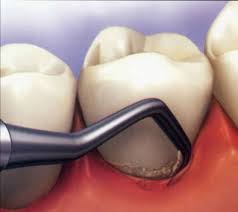
Deep Cleaning or rather Scaling and Root Planing is a procedure that allows instrumentation around teeth below their gum level in order to remove calcified plaque called tartar and revert gum health to normal. On average 30% of population needs this kind of cleaning when presented in a dental office. There are two types of this kind of cleaning: comprehensive and limited which encompasses usually 1-3 teeth. The criteria that allow for the classification of deep cleaning are: subgingival calculus (tartar), probing depths of 4mm and more, bleeding on probing as well as radiographic evidence of bone loss.
When plaque, which is a mixture of food and bacteria, is not removed from teeth a loss of periodontal attachment is a result. The space between the tooth and a gum is where food is being placed during eating. If a contamination is not removed the tissue becomes inflamed and subsequently ill, manifesting its state with enlargement and bleeding. A periodontal pocket becomes deeper with time and in a not cleansable space a tartar becomes to form. If tartar forms a bone loss occurs and teeth become unstable.
The very serious complication is when bacteria from sick gums travel everywhere in the body causing subclinical infection. The organ that is being frequently attacked is heart and the risk of heart disease becomes a real possibility.
Deep cleaning is a procedure usually performed with the adjunct of a local anesthesia, as the teeth are sensitive during the removal od the calculus from the root surfaces. When finished, an antibiotic like Arrestin can be placed in the deepest places, to regenerate the gum and cause additional attachment gain of 2mm. After deep cleaning is finalized the gums will deflate and stop bleeding reducing the pocket depth significantly overall.
If patient went through the deep cleaning procedure a series of maintenance appointment should be scheduled subsequently between 3-4 month intervals.
